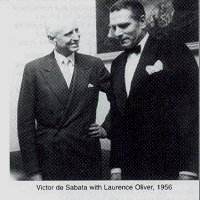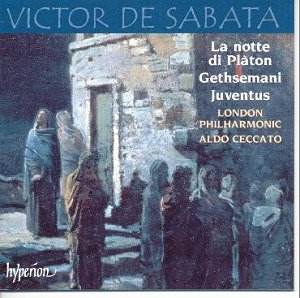
I purposely included the picture of Laurence Olivier with Victor de
Sabata, in this review, so that I could provoke immediate, subliminal
theatrical and cinematic associations. This highly colourful, dramatic,
generously melodic music could so well have been written for the screen.
So often it reminds one of the heady effulgence of Max Steiner and Korngold
in full flow. Hyperion is therefore to be congratulated on recording
these terrific works; it is only to be regretted that de Sabata wrote
so little. It all comes as something of a surprise when one remembers
De Sabata as a gifted conductor. In that capacity, he has left a significant
legacy of recordings of late Romantic and Impressionist music, notably
recordings of works by Debussy and Respighi; and probably the best-ever
recording of Puccini’s Tosca with Callas, di Stefano and Gobbi
(reissued this month by EMI, at mid-price in their ‘Great Recordings
of the Century’ series). [Considering that opera was really the only
genre in demand in Italy, and that so few Italian composers broke away
to compose orchestral or other forms of music (Respighi for instance)
might explain why de Sabata was discouraged from further composition.]
La notte di Plàton (The Night of Plato), written
in 1923, represents the opposites of hedonistic pleasures of the flesh
and the quiet restraint and introspection of the spirit. De Sabata choses,
as his illustration, Plato’s last feast before renouncing pleasure to
follow the teachings of Socrates. A sumptuous, grandiose work, scored
for a huge orchestra, it is extremely colourful and exciting in its
wild orgiastic dances and languid and voluptuous in its suggestion of
carnal earthly pleasures. All this abandon is contrasted with calmer
contemplative material and a memorable melody, aspiring and noble. The
influences are numerous: Richard Strauss certainly, probably Respighi,
and perhaps Mahler.
Night descends on Gethsemane. Peace and tranquility reigns. Pilgrims
looking towards the heavenly stars are overcome with holy ecstasy in
contemplation of the Saviour’s suffering and God’s promise… This is
the scenario of De Sabata’s 1925 composition, Gethsemani
(poema contemplativo). The entire thematic material is based on Gregorian
chant subtly stated at the outset and developed with great beauty and
refinement. This is descriptive, impressionistic music, predominantly
serene and contemplative, the music fragrant colourful and evocative
of moonlit fountains, flowers and birdsong. The violence of our Lord’s
arrest is beheld at arm’s length and not allowed to intrude into the
foreground. The momentous, yet slowly gathering Romantic climax is more
in keeping with the Passion of Christ’s love for the world and its redemption,
rather than his suffering (although, in the decrescendo, this image
may be just apparent). One can easily imagine this music being used
in some Hollywood biblical epic.
Probably the most ‘Golden Age of Hollywood’ - like music comes in
the shortest of the three works, Juventus (Youth), composed
by De Sabata in 1919. In this composition, De Sabata sets confident
thrusting music against passages of restraint to suggest the joy and
passion of youth as opposed to the hesitant, inhibition and disillusionment
of increasing years. In this fulsome melodic composition, in De Sabata’s
most Romantic voice there are pre-echoes of Max Steiner and Korngold.
I feel sure, for instance, that Bette Davis would have given her eye-tooth
to have this composition underscore Dark Victory or Mr Skeffington.
For all unashamed romantics -- this recording is absolutely fabulous.
Don’t miss it. If only today’s composer’s of film music could find such
a lyrical and unrestrained voice. I hope that Hyperion can find enough
material to produce a second ‘composed by Victor de Sabata’ album.
Ian Lace


